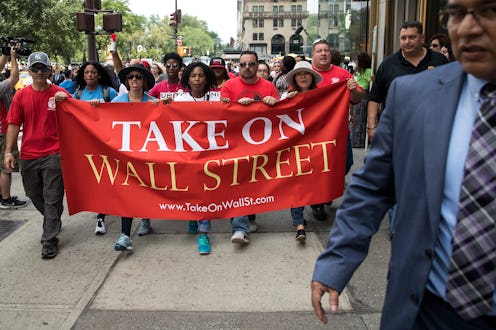Life
6 Latinx Women Who Fought To End The Pay Gap — Who You Probably Never Learned About In School

If you didn’t know by now, today the Latinx community is celebrating Latina Equal Pay Day, a day of dedicated towards bringing awareness to the workplace and wage disparities Latinx women face. Though women’s Equal Pay Day is held annually on April 4, Latinx women experience the largest wage gap, earning an average of 54 cents for every dollar a white, non-Latinx man makes. Not to mention, racial discrimination in the workplace against both non-Latinx and Latinx people of color persists in America, and the abuses only become heightened for Latinx women who also face gender discrimination.
Workplace discrimination against Latinx of color is nothing new. During the 19th century, following the Mexican-American War, the economy of the United States relied heavily on the inexpensive labor of Mexican people. The history of abuse against migrant farm laborers during that time period subsequently impacted the workplace mistreatment and harassment Latinx of color still face today. As recently as Oct. 25, Bloomberg reported that three female Latinx engineers filed a lawsuit against Uber, alleging that the company doesn't pay female employees the same as male ones.
Latinx people have always been at the forefront of the labor rights movement in the United States, as well as civil rights. Though male labor leaders like Cesar Chavez often receive credit for their impact on the labor movement, Latinx women were important leaders to some of the most historic victories in the labor rights movement. Here are six Latinx labor activists you probably never learned about in school, but should definitely know about today.
Dolores Huerta
Dolores Huerta, 87, is a grassroots labor and civil rights activist who founded the Agricultural Workers Association (AWA) in 1960, and co-founded the United Farm Workers (UFW). Huerta faced both sexism and racism as a Latina farmworker, and is credited for bringing women of color to the forefront of the labor movement. Huerta's contribution to the labor movement is often overshadowed by her male co-founder Cesar Chavez, and the famous phrase Sí, Se Puede (Yes, we can) is often attributed to Chavez, despite the fact Huerta coined it.
Luisa Moreno
Guatemala-born immigrant Luisa Moreno was a political activist, reporter, and labor organizer who was crucial to the labor movement in the U.S. in the 1930s, and throughout World War II. Her work as an activist began in New York City, when she was beaten by police during a strike at Zelgreen's Cafeteria. Moreno spent most of her time in Southern California where she organized several committees to support Mexican immigrant workers during WWII, including during the Sleepy Lagoon Case, in which over 300 Chicano youth were rounded up and tried for the murder of a man named José Díaz. She also launched the National Congress of Spanish-Speaking Peoples, with the goal of uniting Spanish-speaking folks in the U.S.
Jessie De La Cruz
Jessie Lopez De La Cruz was the first female recruiter that joined the United Farm Workers, and fought tirelessly for the rights of rural and poor workers — especially trabajadores. De La Cruz herself was a field worker since the age of five, and made it her lifelong goal to fight labor exploitation well into her retirement. Her legacy is often overlooked, but her contributions to labor rights have shaped the modern day movement.
Carmelita Torres
Though Carmelita Torres only took place in one protest, her actions were extremely impactful. Torres was a 17-year-old maid who crossed the Mexican-American border daily to work in a Texas home. Every day, Torres and thousands of Mexican workers were forced to bathe in kerosene and vinegar at the border by U.S. Customs agents, because it was believed the workers were infested with lice. However, in 1917, Torres refused to engage in this humiliating process one day, and sparked thousands of others to refuse the treatment; her resistance became known as The Bath Riots, and Torres never protested again.
Linda Chavez-Thompson
Mexican-American Linda Chavez-Thompson is a powerhouse in the labor movement, who served as the first Latina Vice President on The American Federation of Labor and Congress of Industrial Organizations (AFL-CIO) from 1995 until 2007. She has worked in numerous organizations as a labor leader, including the National Interfaith Committee for Worker Justice, the Institute for Women’s Policy Research and the Congressional Hispanic Caucus Institute. Her work has helped improve the quality of labor unions, and she continues to raise the bar, as she was once the highest ranking women in the labor movement.
Emma Tenayuca
Emma Tenayuca was a Mexican-American labor leader, teacher, and community organizer who was jailed many times for her participation in labor rights' protests. The Latinx activist, who was referred to as "La Pasionaria de Texas" (aka, "The Passionflower of Texas"), led the 1938 Pecan-Sheller's Strike for the National Workers' Alliance — a struggle many historians consider to be the first significant victory towards labor equality made by Mexican-Americans. After being blacklisted for joining the Communist Party in 1939, Tenayuca moved to California to pursue an education, and continue her work as a labor leader.
Latinx women have always been essential to the labor movement, despite being routinely left out of the history books and our conversations. On Latina Equal Pay Day, take time to remember these Latinx activists who fought tirelessly for human rights, and keep the activist work they started going.